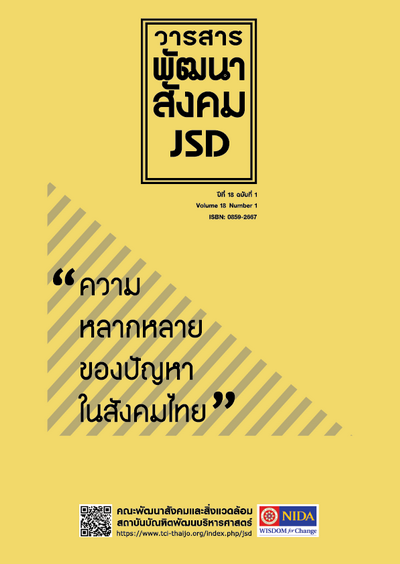ปัจจัยที่มีอิทธิพลต่อการเปลี่ยนแปลงการใช้จ่าย ของครัวเรือนไทย ปี พ.ศ. 2548-2555 The Factors Affecting Changes in the Household Expenditures in Thailand, 2005 – 2012
Main Article Content
Abstract
การศึกษาครั้งนี้มีวัตถุประสงค์เพื่อศึกษาปัจจัยที่มีอิทธิพลต่อการเปลี่ยนแปลงการใช้จ่ายของครัวเรือนโดยวิเคราะห์การเปลี่ยนแปลงการใช้จ่ายใน 2 มิติคือ การเปลี่ยนแปลงระหว่างครัวเรือน และการเปลี่ยนแปลงภายในครัวเรือน การศึกษานี้ใช้ข้อมูลจากโครงการสำรวจเพื่อติดตามภาวะเศรษฐกิจและสังคมของครัวเรือน (ใช้ตัวอย่างซ้ำ) ตั้งแต่ปี พ.ศ. 2548-2555 ของสำนักงานสถิติแห่งชาติ ผลการศึกษา พบว่าการใช้จ่ายของครัวเรือนไทยเพิ่มสูงขึ้นอย่างต่อเนื่องตลอดช่วงปีที่ทำการศึกษาจาก 8,740.83 บาทในปี พ.ศ. 2548 เป็น 14,797.62 ในปี พ.ศ. 2555 เมื่อพิจารณาอัตราการเปลี่ยนแปลงการใช้จ่าย พบว่าช่วงปี พ.ศ. 2548-2550 มีการเปลี่ยนแปลงประมาณร้อยละ 15 ซึ่งสูงกว่าช่วงปี พ.ศ. 2550-2553 และช่วงปี พ.ศ. 2553-2555 อย่างไรก็ตาม พบว่าโครงสร้างการใช้จ่ายของครัวเรือนในช่วงปีที่ศึกษาไม่มีการเปลี่ยนแปลง ครัวเรือนไทยยังคงให้ความสำคัญกับค่าอาหารเครื่องดื่มและยาสูบเป็นหลัก โดยมีสัดส่วนประมาณ 2 ใน 5 ของการใช้จ่ายทั้งหมด รองลงมาเป็นหมวดการเดินทางและยานพาหนะร้อยละ 20 สำหรับปัจจัยที่ส่งผลต่อการใช้จ่ายของครัวเรือน ทั้งการวิเคราะห์การเปลี่ยนแปลงระหว่างครัวเรือนและภายในครัวเรือน พบว่า รายได้ของครัวเรือน ภาระพึ่งพิงวัยเด็ก ภาระพึ่งพิงวัยสูงอายุ และขนาดของครัวเรือน มีอิทธิพลต่อการเปลี่ยนแปลงการใช้จ่ายของครัวเรือนอย่างมีนัยสำคัญทางสถิติ ในขณะที่อิทธิพลขององค์ประกอบของเพศชาย-หญิงในครัวเรือน และการปรึกษาบุคลากรด้านสุขภาพของสมาชิกในครัวเรือนไม่มีนัยสำคัญทางสถิติ นอกจากนี้ยังพบว่าการวิเคราะห์ใน 2 มิติดังกล่าวให้ผลที่แตกต่างกัน ดังนี้ การมีสุขภาพที่ทรุดโทรม และการมีงานทำของสมาชิกในครัวเรือน ส่งผลอย่างมีนัยสำคัญทางสถิติต่อการเปลี่ยนแปลงค่าใช้จ่ายเฉพาะระหว่างครัวเรือนและเฉพาะภายในครัวเรือน ตามลำดับ
The main purpose of this study was to examine the factors affecting changes in household expenditures by considering changes from two perspectives, i.e., between- and within-household analysis. Data derived from the Household Socio-Economic Panel Survey (SES) conducted by the National Statistical Office of Thailand (NSO) during 2005-2012 was utilized in this study. The results indicated that household expenditures increased from 8,740.83 baht in 2005 to 14,797.62 baht in 2012. The rate of increase during 2005-2007 was about 15%, which was higher than in 2007-2010 and 2010-2012. However, the composition of household expenditure remained unchanged during the study period. The first and the second highest proportions of household expenditures were in the categories of food, beverages, and tobacco (40%), and of vehicles and transportation (20%), respectively. Regarding the factors affecting changes in household expenditures, both between- and within-households analyses found that the impacts of household income, child dependency, old-age dependency, and size of household were statistically significant, whereas the household’s sex composition and consultation with health personnel on the part of the household members were not significant. Moreover, the two types of analyses also yielded different results. It was found that the deteriorated health status of household members significantly influenced the changes in between-household expenditures. However, the working status of household members significantly influence changes in the within-household expenditures.


